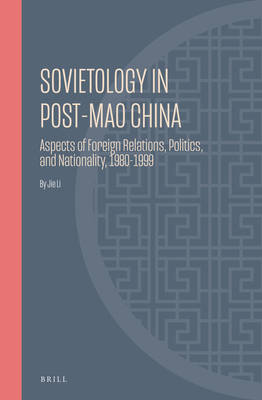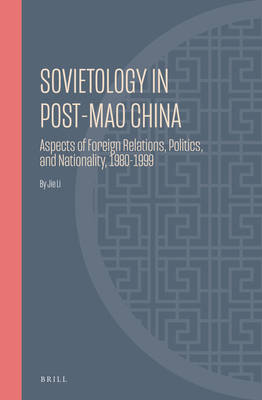
- Afhalen na 1 uur in een winkel met voorraad
- Gratis thuislevering in België vanaf € 30
- Ruim aanbod met 7 miljoen producten
- Afhalen na 1 uur in een winkel met voorraad
- Gratis thuislevering in België vanaf € 30
- Ruim aanbod met 7 miljoen producten
Zoeken
Sovietology in Post-Mao China
Aspects of Foreign Relations, Politics, and Nationality, 1980-1999
Jie Li
€ 215,45
+ 430 punten
Omschrijving
The breakup of the Union of Soviet Socialist Republics (USSR) in 1991 had significant repercussions on Chinese politics, foreign policy, and other aspects. In this book, Jie Li examines the evolution of Chinese intellectual perceptions of the Soviet Union in the 1980s and 1990s, before and after the collapse.
Relying on a larger body of updated Chinese sources, Li re-evaluates many key issues in post-Mao Chinese Sovietology, arguing that the Chinese views on the Soviet Union had been influenced and shaped by the ups-and-downs of Sino-Soviet (and later Sino-Russian) relations, China's domestic political climate, and the political developments in Moscow. By researching the country of the Soviet Union, Chinese Soviet-watchers did not focus on the USSR alone, but mostly attempted to confirm and legitimize the Chinese state policies of reform and open door in both decades. By examining the Soviet past, Chinese scholars not only demonstrated concern for the survival of the CCP regime, but also attempted to envision the future direction and position of China in the post-communist world.
Relying on a larger body of updated Chinese sources, Li re-evaluates many key issues in post-Mao Chinese Sovietology, arguing that the Chinese views on the Soviet Union had been influenced and shaped by the ups-and-downs of Sino-Soviet (and later Sino-Russian) relations, China's domestic political climate, and the political developments in Moscow. By researching the country of the Soviet Union, Chinese Soviet-watchers did not focus on the USSR alone, but mostly attempted to confirm and legitimize the Chinese state policies of reform and open door in both decades. By examining the Soviet past, Chinese scholars not only demonstrated concern for the survival of the CCP regime, but also attempted to envision the future direction and position of China in the post-communist world.
Specificaties
Betrokkenen
- Auteur(s):
- Uitgeverij:
Inhoud
- Aantal bladzijden:
- 328
- Taal:
- Engels
- Reeks:
- Reeksnummer:
- nr. 29
Eigenschappen
- Productcode (EAN):
- 9789004540910
- Verschijningsdatum:
- 16/02/2023
- Uitvoering:
- Hardcover
- Formaat:
- Genaaid
- Afmetingen:
- 155 mm x 226 mm
- Gewicht:
- 612 g

Alleen bij Standaard Boekhandel
+ 430 punten op je klantenkaart van Standaard Boekhandel
Beoordelingen
We publiceren alleen reviews die voldoen aan de voorwaarden voor reviews. Bekijk onze voorwaarden voor reviews.








